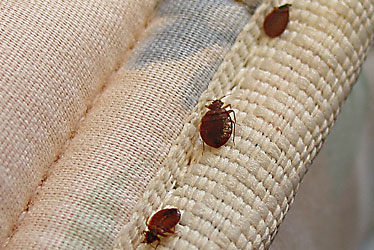
Bed bugs feast on a regular diet of human blood
Those childhood warnings to not let the bed bugs bite are taking on new meaning in beds from New York to Los Angeles—and many beds in between. Although the insects do not transmit disease, living with these bloodsuckers can be traumatic. And the problem is growing in both cities and the suburbs. According to the National Pest Management Association, bed bug calls nationwide jumped more than 63 percent between 2000 and 2004. Today, the infestations are "nearly an epidemic in Manhattan and other U.S. cities," says Robert Pineiro, a supervisor for Terminix in White Plains, New York.
"Of all the insects that invade your home, bed bugs are the worst, because they are hard to control and even harder to prevent," says Richard Pollack, Ph.D., an entomologist at the Harvard School of Public Health. The bugs hide close to their warm-blooded prey in mattresses, box springs, floorboards and clothing. They usually remain out of sight during the day, making them hard to find and difficult to completely eliminate. Even when you're bitten, the anesthetic the bugs inject numb you to the fact that it is happening. The only trace they'll leave—apart from the welts—is blood-or feces-stained sheets.

ORKIN, INC.
BLOODSUCKERS: Bed bugs line up on the arm of a couch |
Bed bug infestations have nothing to do with cleanliness. The bugs are great "hitchhikers," says Fred Rozo, an associate certified entomologist at Western Exterminator Pest Control in Southern California. A bug can crawl into your suitcase or your jacket pocket, and once you bring it to your house, you can have an infestation. "You can pick up bed bugs at the best or worst hotels," Rozo says.
What's behind the bed bug renaissance? One reason could be the more-targeted, less powerful pesticides in use today. Increased international travel and immigration from the developing world are other possible explanations.
Prevention is not easy. Experts advise that you vacuum your suitcase and wash all of your clothes in hot water after you return from a vacation where you've seen signs of the pests. If you have the bugs in your home, wrapping your mattress and box spring with a plastic or allergen cover and placing the bed legs in cups of water may keep the insects out of your bed. Filling cracks in walls where bugs may crawl in from other rooms or buildings is another recommendation. Multiple pesticide treatments from professional exterminators are necessary.
White and O'Neill are still in the middle of that cleanup process and are anxiously waiting for the day that it is done. "You lay in bed, and you start thinking about the bed bugs," White said, "and then you feel like they are crawling on you—whether or not they really are."
(names have been changed in this article)
